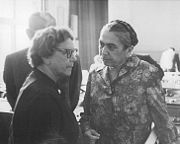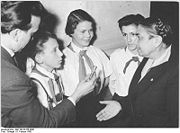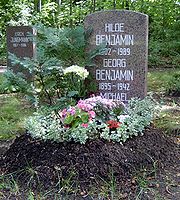
Hilde Benjamin
Encyclopedia


Hilde Lange was born in Bernburg
Bernburg
Bernburg is a town in Saxony-Anhalt, Germany, capital of the district of Salzlandkreis. It is situated on the river Saale, approx. 30 km downstream from Halle. The town is dominated by its huge Renaissance castle featuring a museum as well as a popular, recently updated bear pit in its...
, Anhalt
Anhalt
Anhalt was a sovereign county in Germany, located between the Harz Mountains and the river Elbe in Middle Germany. It now forms part of the state of Saxony-Anhalt.- Dukes of Anhalt :...
. She studied law in Berlin, Heidelberg
Heidelberg
-Early history:Between 600,000 and 200,000 years ago, "Heidelberg Man" died at nearby Mauer. His jaw bone was discovered in 1907; with scientific dating, his remains were determined to be the earliest evidence of human life in Europe. In the 5th century BC, a Celtic fortress of refuge and place of...
and Hamburg
Hamburg
-History:The first historic name for the city was, according to Claudius Ptolemy's reports, Treva.But the city takes its modern name, Hamburg, from the first permanent building on the site, a castle whose construction was ordered by the Emperor Charlemagne in AD 808...
from 1921 to 1924. Afterwards, she worked as a practicing attorney in Berlin-Wedding
Wedding (Berlin)
Wedding is a locality in the borough of Mitte, Berlin, Germany and was a separate borough in the north-western inner city until it was fused with Tiergarten and Mitte in Berlin's 2001 administrative reform...
for the Rote Hilfe
Rote Hilfe
The Rote Hilfe was the German affiliate of the International Red Aid. The Rote Hilfe was affiliated with the Communist Party of Germany and existed between 1924 and 1936.- Origin :...
, a Communist aid organization. In 1926 she married Georg Benjamin, the brother of writer Walter Benjamin
Walter Benjamin
Walter Bendix Schönflies Benjamin was a German-Jewish intellectual, who functioned variously as a literary critic, philosopher, sociologist, translator, radio broadcaster and essayist...
, and in 1927 she joined the Communist Party
Communist Party of Germany
The Communist Party of Germany was a major political party in Germany between 1918 and 1933, and a minor party in West Germany in the postwar period until it was banned in 1956...
. Forbidden to practice law after 1933, she worked for the Soviet trade association in Berlin. During World War II
World War II
World War II, or the Second World War , was a global conflict lasting from 1939 to 1945, involving most of the world's nations—including all of the great powers—eventually forming two opposing military alliances: the Allies and the Axis...
, she was forced to work in a factory from 1939-45. Her Jewish husband was killed at the KZ Mauthausen in 1942.
After the war, she joined the SED
Socialist Unity Party of Germany
The Socialist Unity Party of Germany was the governing party of the German Democratic Republic from its formation on 7 October 1949 until the elections of March 1990. The SED was a communist political party with a Marxist-Leninist ideology...
in 1946 and was vice president of the Supreme Court of the GDR from 1949 to 1953. In that capacity she assisted with the Waldheim Trials and presided over a series of show trials against political undesirables, such as against the Burianek group and Jehovah's Witnesses
Jehovah's Witnesses
Jehovah's Witnesses is a millenarian restorationist Christian denomination with nontrinitarian beliefs distinct from mainstream Christianity. The religion reports worldwide membership of over 7 million adherents involved in evangelism, convention attendance of over 12 million, and annual...
. Her frequent death sentences earned her the popular sobriquet
Sobriquet
A sobriquet is a nickname, sometimes assumed, but often given by another. It is usually a familiar name, distinct from a pseudonym assumed as a disguise, but a nickname which is familiar enough such that it can be used in place of a real name without the need of explanation...
s "The Red Guillotine
Guillotine
The guillotine is a device used for carrying out :executions by decapitation. It consists of a tall upright frame from which an angled blade is suspended. This blade is raised with a rope and then allowed to drop, severing the head from the body...
" and "Bloody Hilde".
From 1949 to 1967 she was a member of the Volkskammer
Volkskammer
The People's Chamber was the unicameral legislature of the German Democratic Republic . From its founding in 1949 until the first free elections on 18 March 1990, all members of the Volkskammer were elected on a slate controlled by the Socialist Unity Party of Germany , called the National Front...
and from 1954 to 1989 a member of the Central Committee
Central Committee
Central Committee was the common designation of a standing administrative body of communist parties, analogous to a board of directors, whether ruling or non-ruling in the twentieth century and of the surviving, mostly Trotskyist, states in the early twenty first. In such party organizations the...
of the SED. In 1953 she succeeded Max Fechner
Max Fechner
Max Fechner was a Minister of Justice of the GDR.Fechner was a trained tool maker. He joined the SPD in 1910, was a member of the USPD from 1917 to 1922, and then returned to the SPD...
as Minister of Justice
Ministerrat
The Council of Ministers of the German Democratic Republic was the chief executive body of East Germany from November 1950 until the GDR was unified with the Federal Republic of Germany on 3 October 1990...
. GDR leader Walter Ulbricht
Walter Ulbricht
Walter Ulbricht was a German communist politician. As First Secretary of the Socialist Unity Party from 1950 to 1971 , he played a leading role in the creation of the Weimar-era Communist Party of Germany and later in the early development and...
asked her to resign in 1967, ostensibly for health reasons but in reality because the Politburo felt that the political fanaticism that characterised her harsh verdicts impeded the GDR's desire for international recognition.
Benjamin was instrumental in authoring the penal code and the code of penal procedure of the GDR and played a decisive role in the Stalinist reorganization of the country's legal system. From 1967 to her death she held the chair for the history of the judiciary at the Deutsche Akademie für Staats- und Rechtswissenschaft in Potsdam-Babelsberg. She died in East Berlin
East Berlin
East Berlin was the name given to the eastern part of Berlin between 1949 and 1990. It consisted of the Soviet sector of Berlin that was established in 1945. The American, British and French sectors became West Berlin, a part strongly associated with West Germany but a free city...
in April 1989.
Benjamin received several awards in the GDR: in 1962 the Fatherland Order of Merit (Vaterländischer Verdienstorden), in 1977 and 1987 the Order of Karl Marx
Order of Karl Marx
The Order of Karl Marx was the most important order in the German Democratic Republic . Award of the order also included a prize of 20,000 East German marks....
, in 1979 the title of Meritorious Jurist of the GDR (Verdiente Juristin der DDR) and in 1982 the Star of Friendship of Nations
Star of Friendship of Nations
The Star of People's Friendship was an order awarded by the German Democratic Republic .Established 20 August 1959, it was given to individuals of exceptional merit who had contributed to the "understanding and friendship between nations and preservation of peace".The Star of Friendship of Nations...
.
Literature

- Andrea Feth, Hilde Benjamin - Eine Biographie, Berlin 1995 ISBN 3-87061-609-1
- Marianne Brentzel, Die Machtfrau Hilde Benjamin 1902-1989, Berlin 1997 ISBN 3-86153-139-9
- Heike Wagner, Hilde Benjamin und die Stalinisierung der DDR-Justiz, Aachen 1999 ISBN 3-82655-855-3
- Heike Amos, Kommunistische Personalpolitik in der Justizverwaltung der SBZ/DDR (1945-1953) : Vom liberalen Justizfachmann Eugen SchifferEugen SchifferEugen Schiffer , was the German Minister of Finances and Vice-Chancellor from 13 February to 19 April 1919 and 3 October 1919 to 27 March 1920. From 1919 to 1920 and again in 1921 he served as Minister of Justice....
über den Parteifunktionär Max FechnerMax FechnerMax Fechner was a Minister of Justice of the GDR.Fechner was a trained tool maker. He joined the SPD in 1910, was a member of the USPD from 1917 to 1922, and then returned to the SPD...
zur kommunistischen Juristin Hilde Benjamin, in: Gerd Bender, Recht im Sozialismus : Analysen zur Normdurchsetzung in osteuropäischen Nachkriegsgesellschaften (1944/45-1989), Frankfurt am Main 1999, Seiten 109 - 145. ISBN 3465027973 - Zwischen Recht und Unrecht - Lebensläufe deutscher Juristen, Justizministerium NRW 2004, S. 144 - 146

